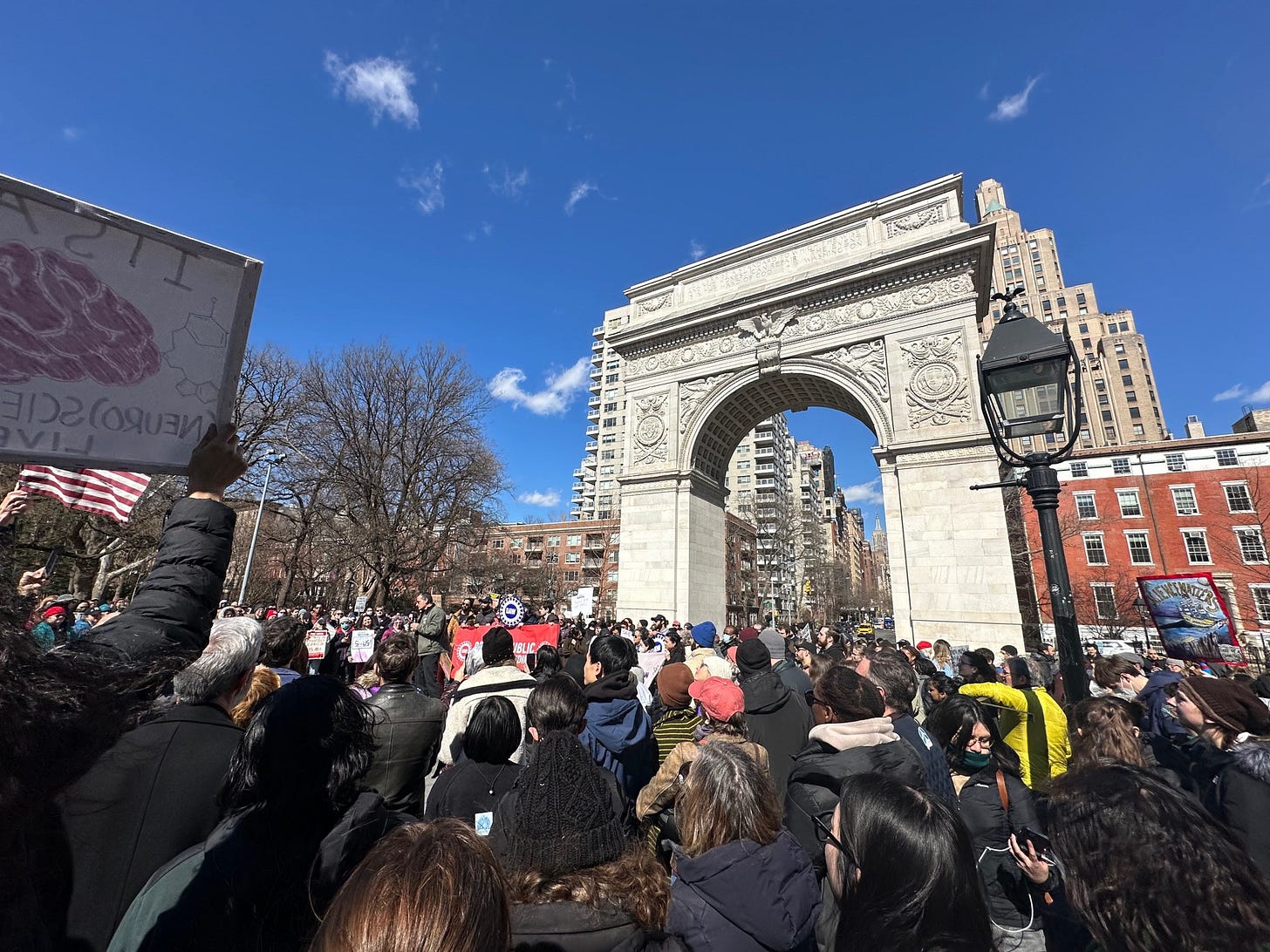Are you standing up for science?
Recently, four more copies of A Field Guide to Grad School were shared with prospective and current PhD students in the United States, bringing our total number of newsletter book winners to 107! Recipients included: Rebecca Beaton, Sasha Bradford, Carla Fox, and David Shin. If you are a prospective or current PhD student in the United States and are interested in receiving a copy of A Field Guide to Grad School, be sure to enter the book giveaway linked below. More information on how to do this is at the end of the newsletter.
Standing Up for Science
On March 7, I joined so many others across the United States (and beyond) in the Stand Up for Science 2025 rallies. This national day of action called for “robust, interference-free scientific research and policies that ensure science serves everyone.” People gathered to “advocate for continued government support for science, defend against censorship, and push back on attacks against diversity, equity, inclusion, and accessibility in research and education.”1 If you’re unfamiliar with the movement, you can learn more about it at this link.
I was fortunate to play a small role in organizing the NYC rally at Washington Square Park—but what I want to highlight is who truly led this effort: graduate students and postdoctoral researchers. The NYC rally, for example, was spearheaded by Rohini Guin, an MD/PhD student at Stony Brook University.
Across the two weeks we worked together, I watched a small group of early-career researchers mobilize their networks, secure speakers, coordinate logistics, and put together an event that drew well over 1,000 attendees. I learned about the behind-the-scenes work required for activism, including how to organize marshals and medics, how to tap news networks, and even how a DJ (a friend of a team member) could help create the right atmosphere to rally for science.
To say I was humbled by their efforts is an understatement.
Who Fights the Hardest?
It’s something worth celebrating: early-career scientists are leading the charge. But it’s also something to reflect upon. Those who stand to lose the most are often the ones fighting the hardest. That doesn’t feel right. I do not mean to minimize the extraordinary efforts of activist scientists who have been advocating for decades. Their work laid the foundation for this movement. But I do wonder: why does so much of the burden fall on those with the least power and job security? (Yes, this question is a bit rhetorical, but I also ask it in earnest.)
In publicizing the event, I learned who among my faculty colleagues prioritizes science advocacy. In conversation with friends, I learned who feels directly threatened by the administration’s funding cuts. And across all of these interactions, I saw who values creating intentional space to redress historical and existing inequities in science.
I’m also struck by who isn’t paying attention. Even people I wouldn’t expect to be concerned about science funding have approached me with questions. I am no expert; however for some, I am their closest connection to science in a university setting. I welcome these conversations. And yet, I can’t help but notice: who is being called to action? Who isn’t? Who even sees what’s happening?
Holding Myself Accountable
This post isn’t just a reflection—it’s a public call to hold myself accountable. I need to do more. I need to be better.
Here’s what I am committing to (not exhaustive, not mutually exclusive):
Adopting an activist mindset and not shying away from it.
Welcoming and seeking out tough conversations, asking institutional decision-makers hard questions in public spaces.
Speaking up, on the record, when colleagues engage in exclusionary practices and inviting others to hold me accountable.
Interrogating my own academic practices, from citation biases to the ways I engage with different ways of knowing.
Recognizing that no one is too young to be part of conversations about science funding (I even put together a resource on talking to kids about this with the help of ChatGPT).
Knowing when to speak and when to listen—monitoring conversations so I understand when my role is to amplify others.
Writing to decision-makers. (And yes, I need to get over my fear of the phone and start making calls—if you want templates, check out 5calls.org).
This list is a start. It’s not enough. But it’s something.
What do you plan to do?
How to reach me: You are always welcome to email me (letstalkgradschool@gmail.com). You can also find me on Bluesky @bskybymidge.
Want to support my #hiddencurriculum efforts? Consider “buying me a coffee” via Ko-fi. All funds will be put back into my Marginalia (formerly Let’s Talk Grad School) initiatives (i.e., webinars, buying/mailing books, etc.). Learn more about my efforts here.
Let’s give away some books: Readers located in the United States are eligible to enter the book giveaway to receive a copy of A Field Guide to Grad School by Dr. Jessica Calarco. To do so, complete this survey and note that you only have to complete it once to be entered in all subsequent giveaways! I do hope to expand the reach of the giveaway; however, at the moment, the shipping costs are too great to scale. If you’d like to talk about ways your institution could secure an electronic (or hard) copy, please let me know.
Wishing you all the best!
Margaret
Quotations used because this language came from a Stand Up for Science email template provided to site organizers.

